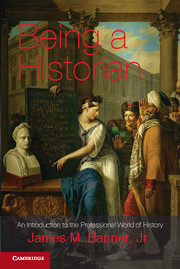Book contents
- Frontmatter
- Contents
- Preface
- Acknowledgments
- 1 The Discipline and Professions of History
- 2 The Structure of the Discipline of History
- 3 A Multitude of Opportunities
- 4 The Academic Trinity
- 5 History outside the Academy
- 6 Teaching and Writing History
- 7 Professional Principles, Responsibilities, Rights
- 8 Being Oneself as Historian
- Index
- References
4 - The Academic Trinity
Research, Teaching, Service
Published online by Cambridge University Press: 05 June 2012
- Frontmatter
- Contents
- Preface
- Acknowledgments
- 1 The Discipline and Professions of History
- 2 The Structure of the Discipline of History
- 3 A Multitude of Opportunities
- 4 The Academic Trinity
- 5 History outside the Academy
- 6 Teaching and Writing History
- 7 Professional Principles, Responsibilities, Rights
- 8 Being Oneself as Historian
- Index
- References
Summary
Although the proportion of academics among professional historians continues slowly to decline, a solid majority of all practicing historians remains employed as faculty members, and more than 60 percent of the known doctoral recipients in history continue to become academics, at least at the start of their professional careers. Equally significant, although an increasing number of historians pursue nonacademic professional work, academic standards continue to be those against which history work is measured in all the occupations in which history is practiced. Even were academics to become a minority among historians – a situation not so unthinkable as it was thirty or forty years ago – it is highly unlikely that standards born in the academy and long proved in their utility both there and elsewhere would become irrelevant to practicing historians, whatever the nature of their work. So thoroughly do academic norms permeate the entire discipline of history, so deeply do they influence the ways in which all efforts at historical understanding are regarded, that no historian can escape their influence. Even those who spend their entire professional lives outside the academy, including those who, as writers of history without doctorates, often scoff at academic conventions and writing, are forced by the strength of academic standards to pay rough obeisance to them. No history work is now conceivable without adherence to these standards.
In most respects, across the entire academic spectrum the strongest of these norms – the creation of knowledge, its diffusion by publication, and the critical evaluation of both by peers – is the research ideal. It is central to the academic enterprise, and it has come to characterize academic work for most people who know little else of a professor's world. Yet research, publication, and criticism hardly exhaust the range or categories of expectations that shape academic work or academic influences on historians’ professional lives. Other expectations and responsibilities, to which most historians are acculturated to some degree early in their careers by virtue of their graduate education in university history departments, equally affect how historians conceive of their work even if that work does not require the uniform application of these other norms.
- Type
- Chapter
- Information
- Being a HistorianAn Introduction to the Professional World of History, pp. 96 - 120Publisher: Cambridge University PressPrint publication year: 2012



